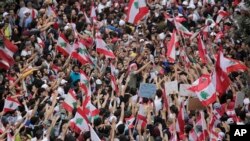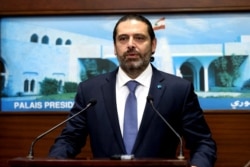Under intense public pressure to alleviate Lebanon's deepening economic crisis, the council of ministers met Monday, approving a series of reform measures which political leaders hope will put an end to five days of public protests. The demonstrations have led to the closure of schools, banks, universities and other institutions.
Large crowds of protesters continued to chant anti-government slogans, despite the approval of 17 austerity measures to alleviate a deepening economic crisis. The measures were given a green light by Lebanon's council of ministers, despite opposition by ministers loyal to Druze leader Walid Jumblatt.
A tired-looking Prime Minister Saad Hariri told journalists following the government's approval of the austerity package that he understood the reasons for the public's outrage.
Hariri says that as reforms stalled, young people became desperate, and things exploded, with people taking to the streets to express their legitimate demands, defend their honor and demand that their voices be heard.
He added that the economic reform package would include no new taxes and impose stringent measures such as salary cuts for public servants and elected officials, efforts to recover stolen government funds, the closure of unnecessary government offices, the revamping of electricity services and the privatization of mobile phone companies.
Government spokesman Mahmoud Mekkiya read a detailed list of government programs that were being slashed.
Jumblatt, who is at odds with President Michel Aoun, withdrew his ministers halfway through Monday's council of ministers in opposition to a number of measures. Wael Abou Faour, who belongs to Jumblatt's bloc, expressed his opposition while speaking with the Lebanese media.
He says that his party does not approve of the way the president pushed through certain economic measures, along with making appointments that are not consensual.
Some protesters reacted with skepticism to the government's measures. An activist by the name of Marie told journalists that protesters "want a new government with new faces, and that she and others are prepared to stay in the streets until their demands are met."
Hilal Khashan teaches political science at the American University of Beirut. He tells VOA that Hariri's reform plan "sounded reasonable," and that it makes sense to "give him a chance to deliver on his promises." "The economy," he says," will collapse sooner (rather than later) if the protests are not halted (soon)."







